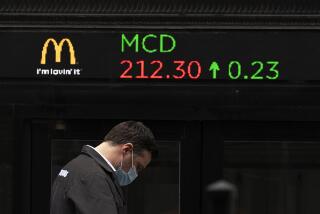W. Germany to Withhold 10% of Investors’ Earnings
- Share via
BONN — The West German government shocked world financial markets Friday by agreeing to introduce a 10% withholding tax on investment earnings to help finance a multibillion-dollar tax reform.
Sources within the ruling center-right coalition said the tax would be withheld by banks and other financial institutions and would affect domestic and foreign investors alike.
In Frankfurt, stocks plunged on the news, shedding 2.7% of their value by the close of trading.
A spokesman for the West German Banking Assn. said the move contradicted government efforts to liberalize domestic financial markets and will encourage capital flight.
A European securities analysts in New York said: “Investors are pretty disgusted . . . this is another turn of the screw on the German capital markets.”
Foreign investors whose countries have reciprocal tax agreements with Bonn will be able to reclaim the levy, which will probably take effect in 1990. But a large number of West Germans, including people saving to build their own homes, will be liable to an investment levy for the first time.
The new tax will raise about $3.8 billion and help offset lower government revenue resulting from reduced income taxes.
Under current law, investors have to declare dividend and interest earnings to tax authorities annually. But the government wants to tighten this collection procedure because many people fail to declare all their investment gains.
The 1990 tax reform is seen by Bonn as crucial to its bid to prop up a sputtering economy and has been used to appease foreign critics of its policy who say West Germany is not doing enough to stimulate growth.
Finance Minster Gerhard Stoltenberg, who has staked his reputation on the reform’s success, intends to cut taxes by $21 billion a year from 1990. But he has said he wants to recoup half that total, mainly by slashing state subsidies in the form of tax concessions.
More to Read
Inside the business of entertainment
The Wide Shot brings you news, analysis and insights on everything from streaming wars to production — and what it all means for the future.
You may occasionally receive promotional content from the Los Angeles Times.









